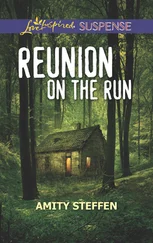I ran. I ran for a long, long time. I ran in a hysterical pattern that was random enough to lose anybody sane. Tearing my way through the weeds and broken tricycles and dirt yards of Dorchester, I didn’t even turn around to see if the boy was still behind me. I ran crazily, crisscrossedly, as some sort of artistic expression, now that I look back at it, of what it felt like to be me.
Later that evening, against my will, I began to cry in front of my father. I was ashamed. I told my father what had happened, that a boy had tried to fight me, but that I had not stood and fought him, but instead I’d run away.
My father put down his fork and looked thoughtful. I stared at his beard, cranberry red at its thickest, and hoped that whatever he’d say would relieve me. He was a man of very few words, and the longer we lived in Boston, the fewer of them there seemed to be. After a moment, he picked up his fork.
“ Natürlich hast Du nicht gekämpft ,” he said. “ Es ist nicht natürlich, zu kämpfen. In Wahrheit ist es natürlich, wegzulaufen .” 3

I will not rehash here the series of contortions, gambits, and hurt surprises that took our custody battle onward to its next, more acute stage. Of course, any shred of hope for marital reconciliation was lost as soon as I enlisted Thron’s services, but I guess I expected that. And although my time with Thron would turn out to be short, for several months that spring he was something of a friend, and I trusted him. So when he proposed we go ahead with the child custody evaluation, I agreed. I would have several long, probing conversations with the evaluator, in the privacy of his or her own office, but first I would meet him or her in public, with Meadow, during a regular visitation.
I picked my site — the playground at Washington Park. This was the playground on which Meadow had virtually grown up. When she was a tot, she had feasted on its wood chips, and when she was old enough to grip the handlebars, she had sagged back and forth on the metal spring horses. In recent years she had learned to kite on the adjacent hill. Whenever I wanted to spoil her, I’d buy her some huge, delta-winged kite made out of brightly colored ripstop, and we’d wait for a good day to try it out. So I pictured us there on our hillside, tethered to the broad blue belly of the sky via one taut string, looking favored, looking somehow worthy of endorsement.
The first stumbling block came with the news that Thron’s pick for our evaluator had been nixed, and soon we were forced to accept a last-minute substitution of a different expert by The Opposition. Also, there was no wind. Awaiting our rendezvous, Meadow and I tried to force the kite into the sky. Several attempts left it flightless in the grass. We tried again, and a rogue gust tacked the kite sharply sideways, where it looped itself around the low branch of a large beech tree. This augured poorly. And I — maybe I was making Meadow nervous? — because the whole goddamned thing was making me nervous, but still —I proposed we rescue the kite. I figured Meadow could easily reach it if she stood on my shoulders.
Usually, it’s easy to get Meadow excited about things like that. All you have to do is add a dash of intrigue, a little pretending, in which our small task becomes a principled affair. ( If we don’t retrieve the kite, the Stalinist zealots will swarm the city by nightfall! ) But that day, I couldn’t get Meadow to play along. She seemed put out, suspicious of me. I could tell she’d been talking about me with her mother. I didn’t really blame them. I think I speak for a lot of divorcing parents here when I say that there’s so much bad shit coming at you during a divorce that a child’s emotional distress takes its place in a whole constellation of problems, and these problems are so numerous that one starts to pin one’s hopes on a legal resolution as some kind of final, almost atomic solution, something obliterative, and until then, well, it’s almost a personnel problem; you don’t have the staff; there aren’t enough yous .
“What’s the matter, Butterscotch?” I asked her.
“Nothing,” she said.
“You sure?”
“Yeah,” she said. “I guess I’m just not feeling partyish.”
“Well, you don’t have to feel party ish. But if nothing’s wrong, maybe could you put a little pep in your step? A little zip in your skip? You look like someone just killed your puppy.”
“I don’t have a puppy.”
“Exactly. Come on. Crack a smile. Please? For me?”
She wandered across the old playground, making a halfhearted sally across the monkey bars. She wore an old purple jumper and white stockings, dingy at the knees. Her hair was lank and flat, slipping out of her headband. Here was one of many moments in which I might have walked away, called the whole thing off, gotten used to being powerless, learned to be patient and conciliatory, and spared us all of what was to follow.
But a car door slammed nearby, and here she came — our potential savior.
I had never seen anyone who looked quite like her. The woman’s face was as round and white as a potato, but her hair was black and coarse. Across her puffy cheeks was a spray of pigmentation, dots too big to be freckles. On each wrist she wore a black splint. She walked from her beat-up Toyota with a slightly neuralgic gait. Although she was one of the homeliest women I’d ever met, I remember thinking, Good. Here is a woman who can sympathize with me. Why else had she entered the field of psychology, but because of her own rich ache?
“Thank you so much for coming,” I said, shaking only the fingers of her hand. “Your expertise means so much to me and Meadow. We just want to resolve this dispute and get our lives back to normal. We’ve been kiting—” I gestured to the snagged object in the beech tree. “Too bad you missed it. Meadow is an excellent kiter. She has excellent motor skills for a child her age. Please…” I gestured toward a picnic table on which I’d set up some supporting materials. “I’ve got some things to show you.”
The evaluator, a Ms. Sonja Vang, followed me. I whistled for Meadow. She peered around the tree and pleadingly shook her head no.
Please? I mouthed.
No. No.
For me?
No.
I turned to Ms. Vang, who was gazing at me evenly, and said, “Meadow can be shy at first. She’ll come around.”
The woman shrugged and rested her splints against the edge of the picnic table.
“To me,” I began, “fatherhood is no onus. It’s not a burden. Some men, I know, take a kind of martyred pleasure in feeling trapped by the family? They like to believe — and this is just my armchair analysis — that were they not trapped by the family, they would be, what, disabling bombs somewhere, breaking a world record, what have you. This belief enables them to a) come up with an explanation for their lack of personal success and b) get out of the more tedious aspects of child rearing — you know what I mean, the bottom wiping, the shushing, the nagging, in general, the relentless being aware of the child — by suggesting that they have been dragooned into the role, away from a higher purpose. Do you know what I mean?”
I smiled, waiting for encouragement. Sonja Vang made no movement except to adjust her bottom against the picnic bench. She was panting slightly. I had my first flash of doubt. Had The Opposition planted a mole?
“From the moment Meadow was born,” I continued, “I was involved with her care. Not because I thought I should be. It was because I wanted to be. When the recession hit, I spent a year at home with her, as her primary caretaker — a stay-at-home dad — which in any court of law would qualify me for custody, though I don’t have to tell you that, right? And so — right — it was my close attention during that year which yielded what I have come to see as a unique understanding of her needs, and the way her mind works. Children aren’t mysteries. We don’t have to teach them sign language, like gorillas. No. We only have to pay attention to what they’re already saying . Do you know what I mean?” I checked to see if Ms. Vang knew what I meant; she was rubbing her eyes with the back of her splint. Helplessly, I continued, “Fathers don’t have to be ‘like mothers.’ Men aren’t soft . Men don’t smell good. You know, floral. But a good father can take a kind of abstract, human interest in the child that a mother is incapable of taking. A good father can help a child develop her aptitudes vis-à-vis a broader social backdrop. I have located a study”—and here I pushed forward several pages, printed off the Internet—“that has proved that children of both genders show better psychological health when living with the father as the custodial parent, due to — well, you can read it yourself.”
Читать дальше













